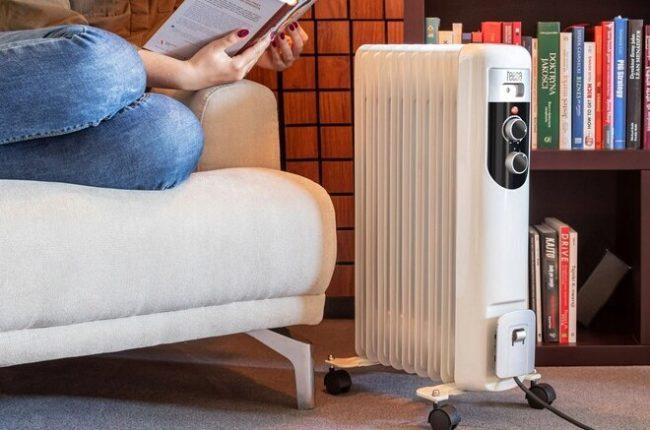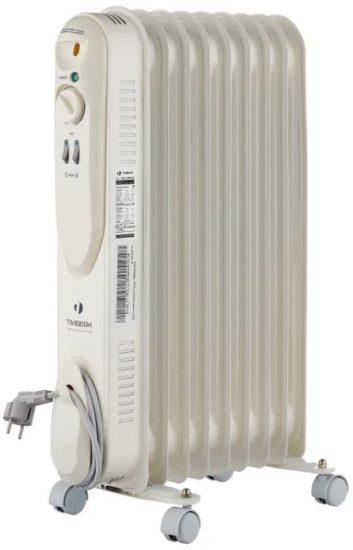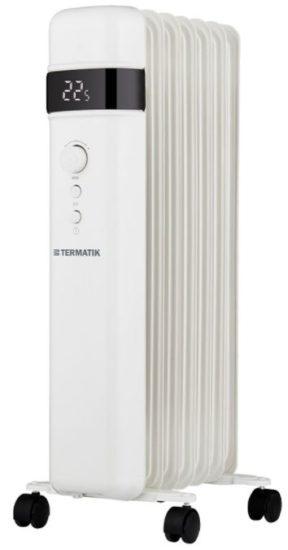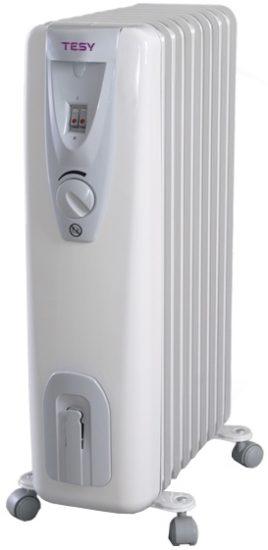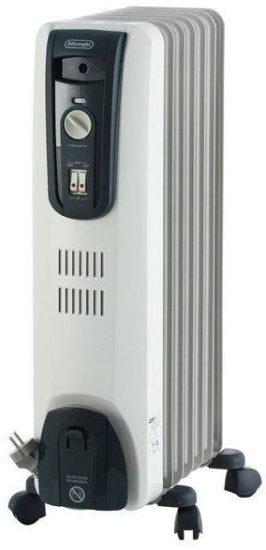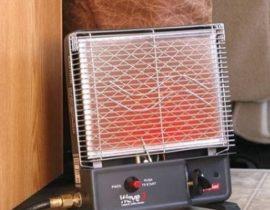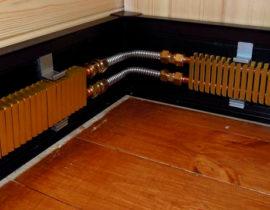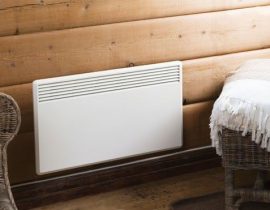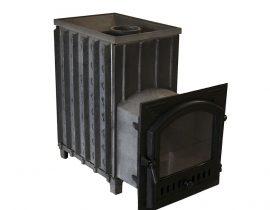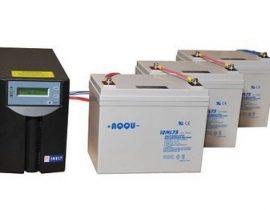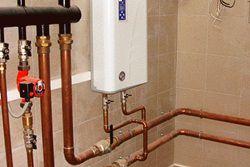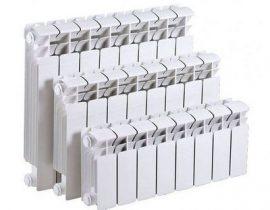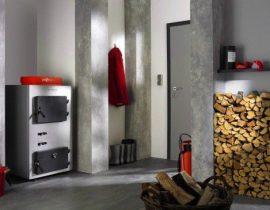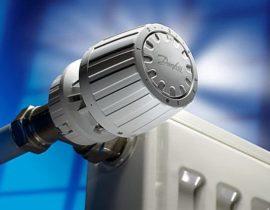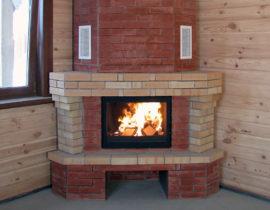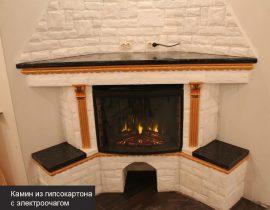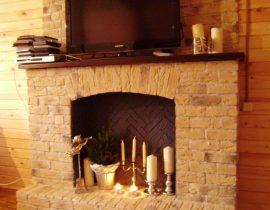Oil radiators are an excellent option for economical space heating. They are actively used in apartments, private houses, offices and warehouses all over the world. A good heater can be up to 99 percent energy efficient because almost all of the electricity it consumes is converted into heat, and this is one of its main advantages.
To date, there is a wide range of heating equipment, in the labyrinths of which it is not difficult for an inexperienced buyer to get lost, so today we have presented the most complete answer to the question: how to choose an oil heater for the home. We'll also talk about what you need to know before buying and find out what the experts have to say. So let's go!
Content
The principle of operation of the oil cooler
The principle of heating with radiator oil type is quite simple. Powered by electricity, it uses current to circulate thermal oil, which in turn is heated. Passing along the edges of the device, the oil radiates heat.
As the temperature around the radiator rises, hot air flows upward, circulating heat and distributing it throughout the room. This process can be slow, but due to the lack of fans or heating coils, an oil cooler consumes less power than an electric type unit. In addition, it is silent, which is also important.
Exploitation
Using an oil heating device is not difficult. You just need to plug it into the socket, wait 10-15 minutes and enjoy the warmth in the whole room.
But there are some rules that must be followed in order to avoid trouble:
- Do not cover the radiator with a cloth or other material, especially with slots in the device. Of course, if necessary, you can dry some things on it, the main thing is that they do not cover the entire device. If the slots are closed for a long time, the device may overheat and the oil may boil.
Boiling oil is the main problem of this type of radiators, because, in addition to damaging the device itself, there is a possibility of splashing hot oil in the room, which can lead to both burns of people in it and a fire.Therefore, be attentive to the condition of the device before using it.
- Radiators are made of an alloy of metals, which, as a rule, are subject to corrosion. Therefore, avoid frequent liquid contact with the surface of the device. If the metal surface of the radiator is corroded, hot oil may leak.
- You need to use only the type of mineral oil that is indicated in the instructions for your device. If you fill in the wrong oil, damage to the device is inevitable.
- It is unacceptable to mix different types of oils. Each liquid contains its own set of additives, and contact of different types of liquids when heated can lead to bad consequences.
- Do not use the device after the expiration date specified in the instructions for it, as well as if its individual elements are damaged.
Pros and cons of oil heaters
Like any equipment, oil heaters have their advantages and disadvantages. Let's take a closer look at each item in order to make the right choice.
Minimum fire hazard level
The oil heater does not have any exposed heating panels or coils. This reduces the chance that the heater will set things on fire. Some models also have an automatic power off feature that is triggered whenever the heater tips over or reaches maximum temperatures.
Distribution of heat throughout the room
The principle of most electric heaters, in particular the heating gun, is to direct the hot flow in one direction. Of course, over time, the room heats up, but if the room is large, or there are gaps, open doors, then this heat will quickly disappear.Another thing is the oil heater. It distributes warm air currents throughout the room, which lasts for a long time.
energy efficiency
An oil radiator is considered an economical type of heating. First, by converting current into heat, it consumes very little energy. Secondly, due to the large heating surface, the device allows you to heat large rooms. And finally, thirdly, unlike other types of heating devices, such as ceramic heaters, the oil-filled version does not cool down quickly when turned off.
This ensures that it still circulates heat for some time after being turned off, further saving energy.
Can be used with a thermostat
An oil filled heater can be connected to a thermostat to make it more energy efficient. When the room reaches the optimum temperature, the thermostat allows the heater to enter sleep mode, which saves energy until the temperature drops below the set level.
Noiselessness
Energy efficient and quiet, oil-type units do not dry out the air like electric models do. All these factors make this option an excellent choice for creating warmth and comfort in your home.
And now it's time to talk about the cons. The disadvantages include the following points:
- Long heating process. The device is not designed to warm up quickly, it will take up to 15 minutes before the device becomes hot. It also takes at least 15-20 minutes for it to cool down.
- Slow heat circulation. Compared to other types, oil heaters do not have fans, and therefore it takes at least 20-30 minutes to circulate heat throughout the room.
- Devices used for large rooms tend to be bulky. In dimensions, they lose to electric ones. But, if you need to heat one room, you can pick up a small radiator that does not take up much space in the room and weighs no more than 5-6 kg.
- Speaking of older models (which are rarely seen in stores), they could freeze during long-term storage at low temperatures. But the new models are improved in this matter, and the problem is solved.
Types of oil coolers
There is a distinction between oil-type heating devices in two categories:
Oil-filled apparatus
This is a typical portable heater that people use in most cases, usually for heating a private house or apartment. The radiator consists of oil-filled pipes or coils, through which heated oil flows by convection. This creates heat on the coils that is radiated into the room to provide the most comfortable room temperature.
oil oven
This is the central unit that provides heat to your entire home. The main unit is usually located in the basement or other storage area in the house. Here the oil is mixed with air and burned. The flame heats up a metal heat exchanger, which then mixes with the air, causing the heat to travel through your home's internal air ducts to deliver it throughout your home.
The main characteristics of modern oil coolers
Experts identify the following technical characteristics that distinguish modern oil coolers from other types of heating devices.
Safety shutdown
When choosing a portable oil heater, make sure it has safety shutdown features to minimize the risk of fire. Options should include overheat protection and rollover protection. Some models also offer freeze protection to ensure that the oil does not freeze if it gets too cold when stored in sub-zero temperatures for long periods of time.
Manufacturer's Warranty
Be sure to look for an oil heater that is backed by a solid warranty from a reputable company. There are many manufacturers and sellers of heaters, and not all heaters are designed to be super reliable and durable. You don't want to invest in a new heater only to have it break shortly after purchase and find you have no way to replace it.
incremental thermostat
While all oil heaters come with adjustable thermostats, those with incremental changes are the most customizable, allowing you to increase or decrease the heater temperature by one degree. Some oil heaters offer very limited temperature settings, making it difficult to achieve the desired level of heat in a room.
Multiple heating settings
A good oil heater will allow you to adjust the amount of heat produced to suit your needs or comfort level. Look for a heater that offers at least two or three heat settings ranging from low to high.
Other considerations
Heat capacity
Think about the size of the space in which you will use the oil heater.Large rooms require 900 to 1500 watts of heating power, while small offices, bathrooms and bedrooms can be adequately heated with a 300-500 watt heater. If you are going to heat a small room, then a larger and more expensive heater is not needed.
Mobility
If you plan to use your oil heater in different areas of your home or office, ease of portability is key. Some oil heaters are bulky and much heavier than other models. Does the device have wheels for easy transport?
Top Brands
At the moment, you can see a huge number of oil devices on the market, but the following are the most popular and modern among all brands.
Honeywell was founded in 1906 by engineer Mark Honeywell. Honeywell was a pioneer in the home plumbing and heating industry and is still known for producing high quality products such as Honeywell's 7-day programmable thermostat and portable air conditioners.
Founded in 1902, the company is a renowned manufacturer of small appliances based in Treviso, Italy. Its espresso machines and coffee makers are among the best in the industry, as is its large line of portable heaters.
Pelonis has been in the portable heating and cooling industry for over 25 years. Based in Exton, Pennsylvania, the company manufactures a robust line of portable air conditioners, fans and radiators of various types.
It is a compact appliance manufacturer that was launched over 15 years ago by Luke Peters, who sold portable air conditioners and other home appliances from his garage.Today, the company has diversified significantly to offer all kinds of small appliances for every taste.
Prices for oil heaters
- 1600-2000 rub.: this price range will give you a limited selection of portable oil heaters. Very tiny and compact models that are suitable for heating small spaces, or models without a lot of extra features, are usually in this price range.
- 2500-4000 rub.: this price range offers many options for oil heaters. Here you will find additional options such as programmable timers, remote control and digital displays.
- More than 4500 rubles: Here you will have access to the most futuristic, sleek oil heater designs that come with all the modern features such as incremental digital temperature control, energy saving modes and more.
Choosing the best oil cooler Top 5
From a wide range of models, experts distinguish the following:
Timberk TOR 21.1809 SLX
This unit's three heat settings and five temperature settings maximize efficiency and control, while a programmable thermostat ensures ease of use. Price 2700-3400 rubles.
Pros:
- Design fits in with a variety of home decors
- Has several safety precautions and a timer with automatic shutdown
Minuses:
- The heater and timer only work at the set temperature and time settings.
- Not as customizable as some other models
Termatic power 1500 W
For a fraction of the cost of other heaters on the market, you can get 1500 watts of power that could heat a medium to large room. It is equipped with several safety features to prevent accidental fires. Price 3600-4000 rubles.
Pros:
- Compact and unobtrusive design, ideal to fit into any interior
- Runs so quietly you might forget it's even there
Minuses:
- Bezel and casting wheel construction doesn't feel as solid as some other models
TESY 2009
This radiator is a good option for home and office due to its portable design. The small size allows this device to easily fit under a table or next to a wall. Price 6500-7000 rubles.
Pros:
- The adjustable thermostat is a nice feature that allows you to customize your comfort level. Despite its compact design, it heats up fairly quickly and efficiently while keeping energy costs low. While this heater may not be the best solution for heating large spaces, it effectively heats a 40 square foot area and is great for small spaces or for use in combination with central heating.
- It works very quietly, which allows you to talk on the phone or watch TV without distraction.
Minuses:
- It would be nice if this heater were more visually appealing, but if you are going to keep it not in the middle of the room, but in a designated area, its design won't really matter.
De'Longhi Oil Filled Heater
This oil heater features comfort temp technology that reduces energy costs and automatically maintains a comfortable temperature in any room you place it in. Heating parameters vary from 700 to 1500 watts. The price varies from 7000 to 76000 rubles.
Pros:
- Aesthetic design automatically maintains optimal temperature and power settings
- Comes pre-assembled for use right out of the box
Minuses:
- Can collect dust and can be somewhat labor intensive to clean
- Takes up space when not in use
TESY CC 3012 E05 R
Electric oil heater TESY CC 3012 E05 R is an excellent choice of heat for rooms of almost any size. It is equipped with twelve sections that provide 3000W of heat. Price 7900-8500 rubles.
Pros:
- Its easy-to-use thermostat dial allows you to gradually control the temperature of the device.
- This heater provides silent and radiant heat that won't dry your skin like other types of air heaters or annoy you with noisy operation. Like many other models, it is equipped with overheating and rollover protection that turns off the heater as soon as it detects a problem.
Minuses:
- The only thing this heater lacks is a programmable timer that allows you to turn off the device while you sleep or are away from home. Other than that, we like the simple design and solidity of this oil heater.
Expert advice
- Always turn off your oil heater when you leave your home to minimize the risk of fire.
- If you have small children, be sure to place your oil heater in a space that minimizes the risk of accidental tipping or temperature changes by prying hands.
- Be sure to keep the heater in a well-ventilated area away from curtains, furniture, or clutter to avoid accidental overheating or burning.
- Always read online reviews before purchasing to find out what other consumers have experienced with the particular model you are interested in.
Questions and answers
Portable oil heaters are nearly twice as efficient as their forced air ceramic counterparts.
As a general rule, the smaller the cheaper. The cheapest option is to purchase heaters with a lower capacity, which are better suited for small spaces.
The very best oil-filled heater is one that has automatic safety shutdown features, multiple heat settings, and a solid manufacturer's warranty.
Oil radiators generate more energy than other types of portable heaters. A typical 1500 watt oil heater running for six or seven hours a day will generate less than $100 in electricity. per day, compared to a typical ceramic air heater, which will wind up electricity per day for more than 250 rubles, with the same mode of operation. Therefore, oil coolers are among the economical heating devices.
And two words in conclusion
If you have rooms in your home that aren't heated by a central heating system or aren't warm enough if you're looking to cut down on your overall heating costs, portable oil heaters are an efficient and effective option.
They are also great for offices and warehouses. Whether you choose the De`Longhi oil-filled unit, Tesy CC or any other option, you are sure to get a great set of features that will satisfy all your needs for warmth and comfort.
Video review of the top 7 best oil coolers

